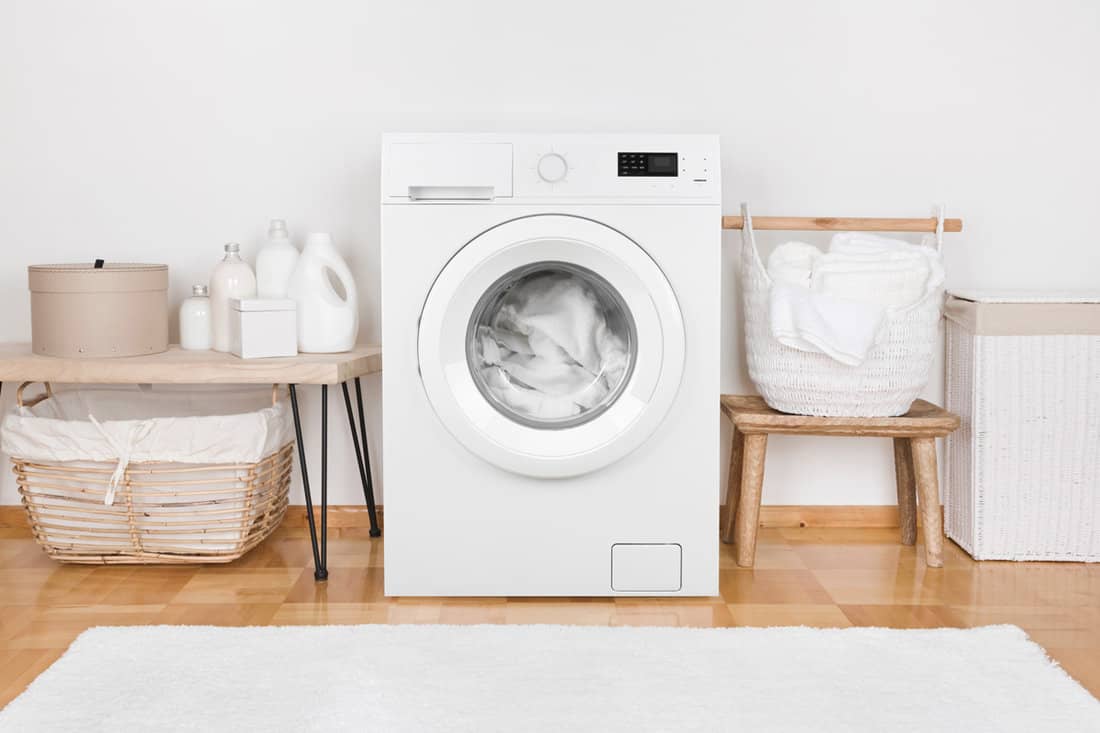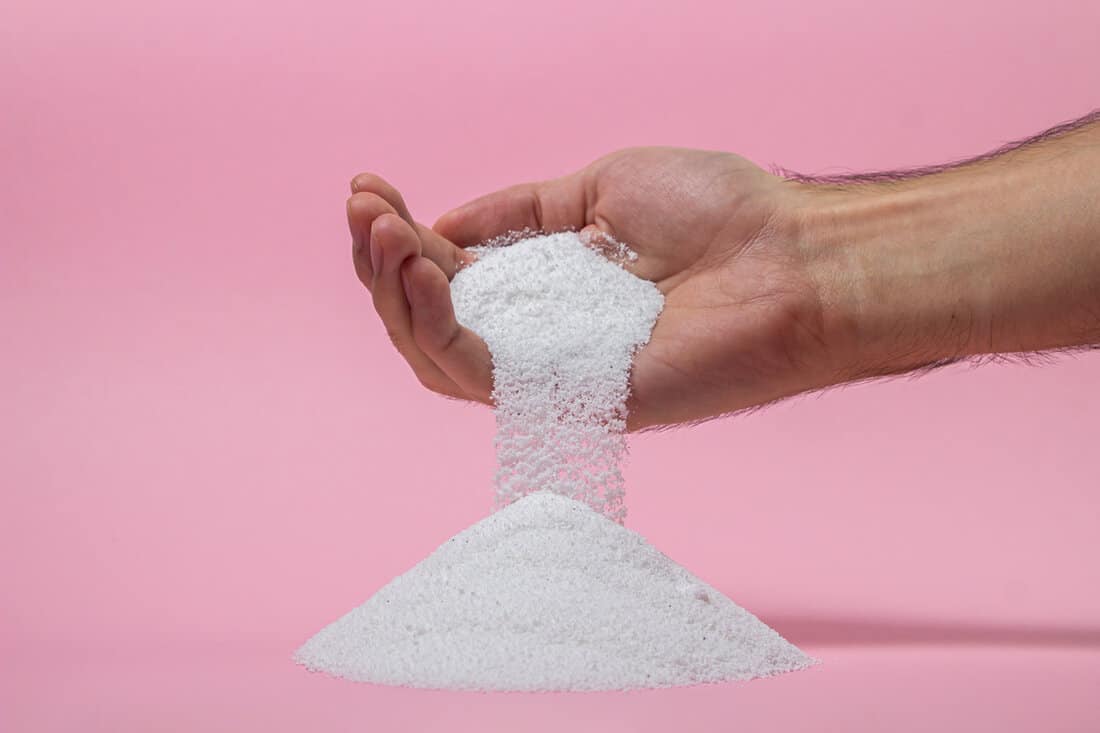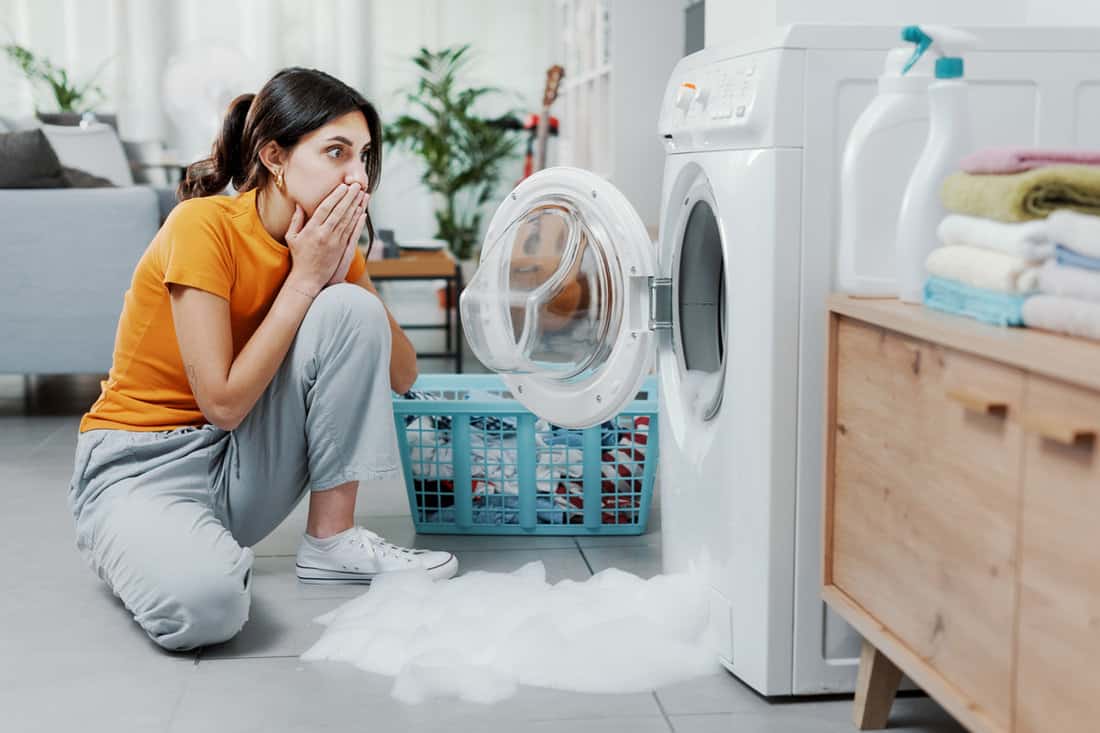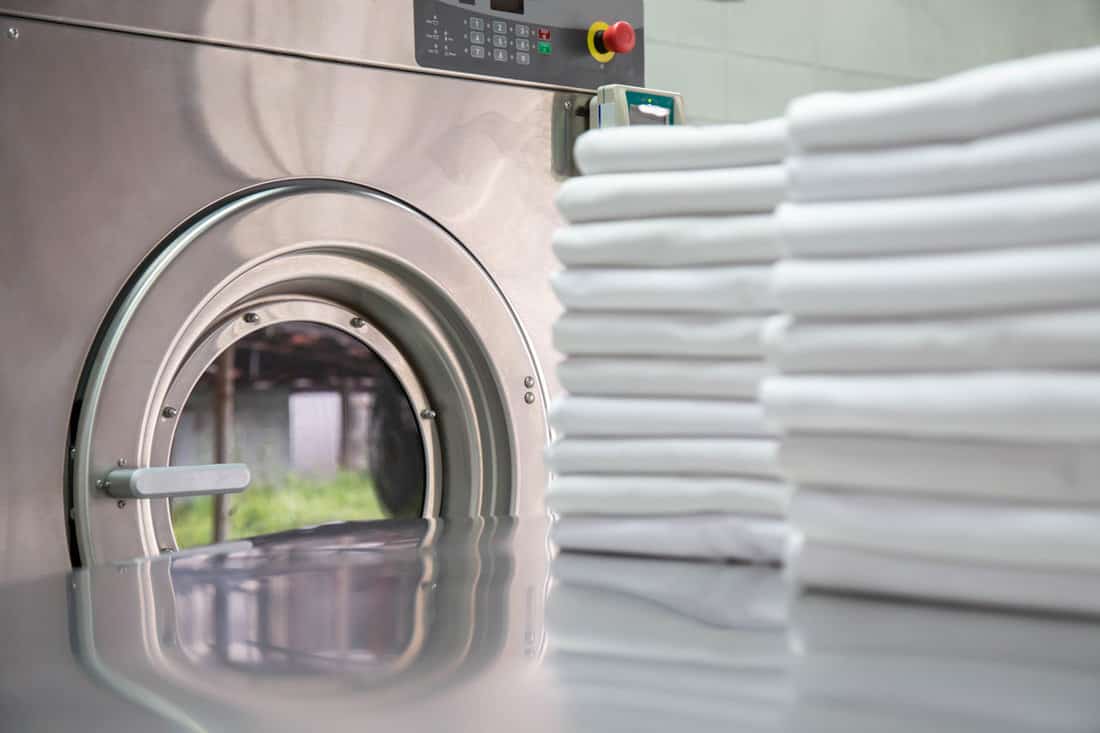Laundry used to be so easy back in the day. You'd add liquid detergent according to the cap's instructions, and boom! Clean laundry. Powder detergent has become increasingly popular as people seek out more concentrated options. If you've never used powder laundry detergent, you might be wondering how to use it. You're not alone, and thankfully, using powder detergent is a cinch.
A typical load of laundry will require between 1/4 to 1/3 of a cup of powder laundry detergent. Much like with liquid laundry detergent, you should add the powder directly into a top-loading laundry drum before you start your wash. If you have a front-loading machine, add the powder into the detergent slot.
Using powder detergent is popular because it's an effective way to get your clothing clean and fresh. Before you buy your first box of powder detergent, read our article to find out more about this style of laundry care.
![Woman throws laundry detergent into the washing machine close-up, How Much Powder Detergent To Use In Washing Machine [And Where To Put It]](https://homedecorbliss.com/wp-content/uploads/2022/09/21.-HOW-MUCH-POWDER-DETERGENT-TO-USE-IN-WASHING-MACHINE-AND-WHERE-TO-PUT-IT.jpg)
Can You Use Powder Detergent In The Washer?

We may include affiliate links and curated AI content to highlight top design styles.
Powder detergent is perfectly safe to use in a washing machine and has been used since washing machines were invented. They are generally easy to use and are easy to measure. To date, there are no washing machines that reject the use of powder detergent.
However, it's important to recognize that you need to know where to place the detergent. Shoving it in the washing machine tub isn't always wise—but don't worry, we'll discuss that more later.
Where Should You Place Your Powder Detergent?
If your washing machine has a detergent dispenser or detergent slot, then you should put powder detergent in there. This is the standard mode of use for front-loading washers. Top-loading washers, on the other hand, tend to be fine with having the detergent dropped inside the tub before you turn on the wash.
Pro tip—if you have a top-loader, turn on the water before you add the powder detergent. It can help mix the detergent a little better.
How Should You Use Homemade Powder Detergent?
Most homemade powder laundry detergents can be used the exact same way as a regular store-bought version. If your recipe is a little gentler on laundry, you may want to add a little extra to your laundry load.
How Much Powder Detergent Are You Supposed To Use?

Powder detergent is not as concentrated as liquid detergent which means you will need slightly more for every load that you make. Let's break it down by the laundry load and washer.
- While liquid detergent typically requires 1/8 of a cup, most powder detergents will require 1/4 of a cup of detergent for every load you put in the wash. This assumes that you have a typical washing machine and a typical laundry load.
- If your laundry load is particularly large and you have a standard washer, you may need to add as much as 1/3 of a cup of powder detergent. Do not use more than 1/3 of a cup since this can cause your clothes to feel sticky or stiff.
- High-efficiency washing machines only require two tablespoons of powder detergent per load. This is true regardless of whether you are using liquid or powder detergent.
- If your powder detergent is given in packet form, use one packet per load. Packeted laundry detergents are pre-measured for your ease of use.
What Happens If You Don't Add Enough Detergent To Your Laundry?
Whenever possible, remember that it's better to use less detergent than required as opposed to more. Using too little detergent doesn't really harm your clothing, per se. It just means that your clothes might still have dirt on them or smell a bit funky after a wash. Washing them again with a little more detergent will fix that.
What Happens If You Add Too Much Detergent To Your Laundry?

The biggest mistake that you can make with your laundry is not necessarily having too little detergent but having too much of it. When you have too much soap, your clothes won't rinse properly and it could "gum up" your washing machine.
These signs suggest that you've added too much detergent (and should add way less on your next round):
- You might notice a slimy or sticky residue on your clothing. If you use a detergent that has a lot of oils in it (like essential oils or a liquid detergent), then it will feel like your clothing has a strange slickness to it. In hotter weather, this turns into a sticky mess.
- You suddenly start breaking out in a rash when you wear clothing from the wash. People who have sensitive skin might find that leftover soap residue could cause a rash or acne.
- The clothes feel stiff and almost starchy to the touch. You might notice that it almost feels powdery at times.
- The clothes you wore smell sour, stinky, or oddly fragrant in a not-good way. Contrary to popular belief, using too much soap can actually make your clothing smell strange. It also can damage your washing machine through buildup that releases a foul odor.
- Your clothing's colors aren't quite what they used to be. Faded colors and greyish whites are the most common telltale sign of excess laundry detergent.
How To Use Powder Detergent As A Pre-Soak
Powder detergent is a great choice for a pre-soak treatment that helps lift stains before you put them in the wash. However, you need to make sure to do it the right way. Here's how to use your detergent to pre-treat your clothing:
- Mix the soaking solution. Grab a tub where you want to soak your clothes. Use a teaspoon of powder laundry detergent per gallon of water.
- Soak the laundry. Leave the laundry to soak for 30 minutes. Rinse off the laundry with cold water.
- Transfer it to the wash. Pop it in the washing machine for a brighter clean. It's worth noting that there is no reason to change the way you do laundry if you do a soak.
Can You Make Your Own Washing Powder?
Yes, you can! It's actually really easy to do and can be a fun project. If you are a fan of keeping things handmade, it's a smart move. To make your own, mix the following items together:
- 1 cup washing soda (sodium carbonate)
- 1 cup baking soda (sodium bicarbonate)
- 1/2 cup borax
- 1 cup of grated bar soap
Using this is a mild way to clean your laundry, and a single load will require 1/3 to 1/2of a cup of powder per wash. As for the grated bar soap? Yep, you should use the same type you use on your body in the shower. You can choose any soap you want, so don't be afraid to splurge on a favorite scent.
Related Questions
When Should You Use More Laundry Detergent?
You should use slightly more laundry detergent if your clothes have been soiled in an unusually heavy way. If your washing machine has a drum size that's larger than average, you may also need to add more.
The suggested amount of detergent on boxes is measured for a washing machine that has a standard-sized drum.
Is Powder Detergent Better Than Liquid Detergent?
It depends on who you ask. Washing powder is better for heavily soiled clothing and tends to do better with warm water—but only slightly so. Liquid detergent tends to be better for spot cleaning, easy measuring, and cold water. However, both are generally perfectly fine to use in typical laundry.
How Can You Measure Detergent Without A Scoop?
The best way to measure detergent without a scoop is to use a measuring cup or a tablespoon. With powder detergent, the best option is to use a measuring cup since you will need more detergent than you might with liquid detergent.
Why Don't People Use Powder Detergent More Often?
Many people tend to find that powder detergent doesn't always fully dissolve in the wash, especially in cold water. If the detergent is very clumpy, it could lead to visible clumps being glued to your clothing or even clogs in your washer's plumbing.
Because of the chance of clumping, this type of detergent fell out of favor until recently.
In Closing

Most people who do their own laundry tend to use far more detergent than they really should, with the assumption that more soap means a better clean.
This just isn't true! In most cases, less is actually more. If you're using more than 1/3 of a cup of washing powder in your laundry, chances are you're overdoing it. When in doubt, check for instructions on the box. They're there to help make laundry easier for you.



![A laundry room with a washing machine and dryer and a boiler on top, How To Hide A Water Heater In The Laundry Room [9 Ideas To Inspire You!]](https://homedecorbliss.com/wp-content/uploads/2022/11/Laundry-room-with-a-washing-machine-and-dryer-and-a-boiler-on-top-600x400.jpg)
I have used little to no detergent for most of my laundry, It takes energy to manufacture detergent, packaging and shipping, Even homemade items are not made within 10 km of your location, So growing homemade items in your garden is another story. I feel using mostly hot water, except on items where colors bleed, and sometimes I will just wash them independent and use the colored water for rags after, Not sure if temperature harms clothes, so using less detergent, I find myself using hotter water, 125 degrees, all the way up to 200 degrees, I feel really hot water cleans, gets smell out etc. I try and use the left over water for outside use or to flush, I also heat some of the water with rooftop pipes, but I feel I save energy even when using electric or fuel to heat water on less detergent.